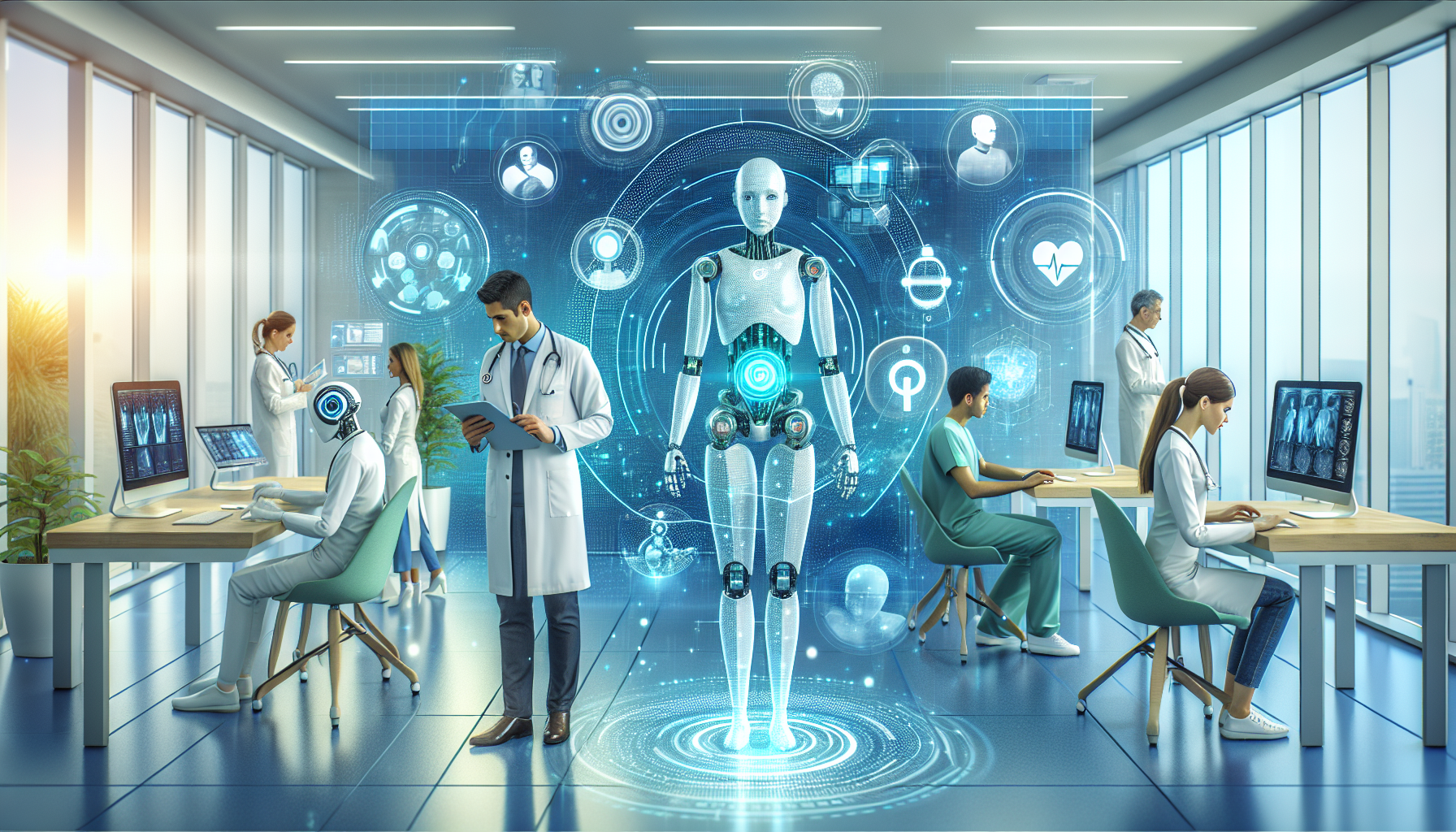Revolutionizing Healthcare AI: MedAgentSim and Q-Insight Innovations
Exploring advanced solutions and research in software development and IT services
Detailed Research & Insights
Continue reading for in-depth analysis and technical details

In a world where healthcare challenges loom larger than ever, the advent of Artificial Intelligence (AI) offers a beacon of hope and transformation. Are you grappling with inefficiencies in patient care or overwhelmed by data management? You’re not alone. As we stand on the brink of a technological revolution, innovations like MedAgentSim and Q-Insight are reshaping how we approach healthcare delivery, promising to enhance outcomes and streamline processes. Imagine an AI that can simulate complex medical scenarios to train practitioners or one that harnesses vast datasets to provide actionable insights for better decision-making—this is not science fiction; it’s happening now! In this blog post, we'll dive deep into these groundbreaking tools, exploring their functionalities and potential impact on patient care while also contemplating future trends in Healthcare AI. Whether you're a healthcare professional seeking solutions or simply curious about the intersection of technology and medicine, this exploration will illuminate how these advancements can empower both providers and patients alike. Join us as we unravel the transformative power of AI in healthcare—your journey toward understanding begins here!
Introduction to Healthcare AI Revolution
The healthcare industry is undergoing a significant transformation with the integration of Artificial Intelligence (AI), particularly through systems like MedAgentSim. This open-source simulated clinical environment enhances Large Language Model (LLM) performance by facilitating dynamic diagnostic processes that mirror real-world doctor-patient interactions. By employing multi-agent systems and self-improvement mechanisms, MedAgentSim allows for iterative learning through experience-based knowledge retrieval and chain-of-thought reasoning. The focus on realistic dialogue not only aids in accurate diagnostics but also addresses biases that can affect model accuracy, emphasizing fairness-aware AI applications.
Key Features of MedAgentSim
MedAgentSim operates in two primary phases: the Conversation Phase, where interactive dialogues occur between virtual patients and clinicians, and the Experience Replay Phase, which utilizes memory buffers for continuous improvement. These features enable LLMs to refine their responses based on previous encounters while ensuring comprehensive evaluations across various simulated scenarios. As advancements continue in domain-specific language models and biomedical text generation tools, the potential for enhanced diagnosis and patient care becomes increasingly evident within this revolutionary framework of healthcare AI technologies.# What is MedAgentSim?
MedAgentSim is an innovative open-source simulated clinical environment aimed at evaluating and enhancing the performance of Large Language Models (LLMs) in dynamic diagnostic settings. This system emphasizes multi-agent systems and self-improvement mechanisms, enabling realistic doctor-patient interactions crucial for medical AI applications. By integrating multi-turn conversations and chain-of-thought reasoning, MedAgentSim facilitates a more nuanced understanding of patient dialogues, thereby improving LLM capabilities in real-world scenarios.
Key Features
The framework operates through two primary phases: the Conversation Phase and the Experience Replay Phase. These components allow iterative improvements via memory buffers and ensembling techniques, addressing biases that can affect model accuracy. Furthermore, it serves as a benchmark for assessing LLM performance across various simulated diagnostic scenarios while focusing on fairness-aware AI to ensure equitable healthcare solutions. The advancements presented by MedAgentSim highlight its potential to revolutionize diagnosis, treatment planning, and overall patient care through enhanced language models tailored specifically for healthcare contexts.# Exploring Q-Insight Innovations
Q-Insight represents a significant advancement in image quality assessment (IQA) through its innovative reinforcement learning-based model. By integrating multi-modal large language models, it enhances the performance of IQA tasks such as score regression and degradation perception. The model employs sophisticated reward functions to optimize visual reasoning capabilities, showcasing improvements across various datasets, particularly in out-of-distribution scenarios. Its ability to analyze factors like lighting conditions and image composition sets it apart from traditional methods. Furthermore, ablation studies demonstrate that joint training significantly boosts performance compared to single-task approaches, highlighting Q-Insight's comprehensive reasoning processes.
Performance Comparison with AgenticIR
When comparing Q-Insight with AgenticIR, notable differences emerge in distortion prediction accuracy and degradation level identification. Q-Insight consistently outperforms AgenticIR across all types of degradations—especially Noise and JPEG Compression—demonstrating superior efficiency in identifying distortion types using fewer queries. While slightly less effective in the "null" category due to sensitivity issues, overall results affirm the robustness of multi-task training within Q-Insight’s framework for enhancing image quality understanding. This positions Q-Insight as a leading solution for addressing challenges faced by existing IQA methodologies while paving the way for future innovations in computer vision applications.

Impact of AI on Patient Care
AI technologies, particularly Large Language Models (LLMs), are transforming patient care by enhancing diagnostic accuracy and improving clinician-patient interactions. Systems like MedAgentSim simulate clinical environments to evaluate LLM performance in dynamic settings, allowing for multi-turn conversations that reflect real-world scenarios. This capability enables healthcare providers to retrieve experience-based knowledge effectively, leading to more informed decision-making during patient consultations.
Enhancing Diagnostic Processes
The integration of AI facilitates iterative improvements through mechanisms such as memory buffers and ensembling techniques. These advancements allow clinicians to engage in meaningful dialogues with patients, ultimately refining the diagnostic process. Furthermore, addressing biases within these models is crucial; fairness-aware AI ensures equitable treatment across diverse populations while maintaining model accuracy. As a result, patients benefit from personalized care tailored to their unique needs and circumstances.
By leveraging sophisticated language models trained on extensive datasets—including electronic health records (EHR)—healthcare professionals can enhance their reasoning capabilities and improve overall patient outcomes. The potential for generative agents in clinical environments signifies a shift towards more interactive and responsive healthcare systems where AI plays an integral role in supporting medical practitioners throughout the entire care continuum.
Future Trends in Healthcare AI
The future of healthcare AI is poised for transformative advancements, particularly through systems like MedAgentSim. This open-source simulated clinical environment emphasizes the integration of multi-agent systems and self-improvement mechanisms to enhance diagnostic accuracy. By facilitating realistic doctor-patient interactions, it allows for dynamic diagnostic processes that adapt based on patient dialogue. The focus on chain-of-thought reasoning and experience-based knowledge retrieval will likely lead to more effective treatment plans tailored to individual patients' needs.
Key Innovations Shaping Tomorrow's Healthcare AI
Emerging trends include the use of fairness-aware AI models that address biases affecting model performance, ensuring equitable healthcare delivery. Furthermore, advancements in language models specific to medical applications are expected to improve communication between clinicians and patients significantly. With tools designed for biomedical text generation and enriched datasets from electronic health records (EHR), these innovations promise enhanced reasoning capabilities essential for accurate diagnostics and personalized care strategies.
As generative agents evolve within clinical environments, they will play a crucial role in augmenting human decision-making processes while maintaining high standards of ethical practice in patient interactions. The convergence of these technologies signals a new era where healthcare providers can leverage advanced AI solutions not only for improved diagnosis but also for comprehensive patient engagement throughout their care journey.

Conclusion: The Next Steps for Innovation
The advancement of healthcare AI, particularly through platforms like MedAgentSim and Q-Insight, signifies a transformative era in medical diagnostics and image quality assessment. Future innovations should focus on refining multi-agent systems to enhance collaborative decision-making among AI models. Emphasizing fairness-aware algorithms will mitigate biases that can skew diagnostic accuracy, ensuring equitable patient care across diverse populations.
Enhancing Training Methodologies
Integrating reinforcement learning techniques into training methodologies can further optimize model performance in dynamic environments. By leveraging experience replay mechanisms and memory buffers, we can facilitate continuous learning from real-world interactions. This iterative approach not only improves diagnostic capabilities but also fosters trust between patients and AI systems.
Expanding Applications Beyond Diagnostics
Moreover, the potential applications of these technologies extend beyond diagnostics to include personalized treatment plans and predictive analytics for patient outcomes. As research progresses, developing comprehensive benchmarks for evaluating LLMs will be crucial in standardizing advancements within the field while promoting transparency in AI-driven healthcare solutions. In conclusion, the advancements in healthcare AI through innovations like MedAgentSim and Q-Insight are set to transform patient care significantly. These technologies not only enhance diagnostic accuracy but also streamline treatment processes, leading to improved outcomes for patients. The integration of AI into healthcare systems promises a future where personalized medicine becomes the norm, allowing for tailored treatments based on individual patient data. As we look ahead, it is crucial for stakeholders in the healthcare sector to embrace these innovations while addressing ethical considerations and ensuring equitable access to technology. Continuous investment in research and development will be essential as we navigate this evolving landscape. Ultimately, by harnessing the power of AI responsibly, we can revolutionize how healthcare is delivered and experienced worldwide.
FAQs about "Revolutionizing Healthcare AI: MedAgentSim and Q-Insight Innovations"
1. What is the main focus of the blog on healthcare AI?
The blog focuses on the advancements in healthcare through artificial intelligence, specifically highlighting innovations like MedAgentSim and Q-Insight, their impact on patient care, and future trends in this field.
2. What is MedAgentSim?
MedAgentSim is an innovative platform designed to simulate medical agents that can assist healthcare professionals by providing insights into patient management, treatment options, and decision-making processes using advanced AI algorithms.
3. How does Q-Insight contribute to healthcare innovation?
Q-Insight leverages data analytics and machine learning to enhance clinical decision support systems. It helps healthcare providers analyze vast amounts of data for better diagnosis, personalized treatment plans, and improved patient outcomes.
4. In what ways does AI improve patient care according to the blog?
AI improves patient care by enabling more accurate diagnoses, personalizing treatment plans based on individual health data, predicting potential health risks before they become critical issues, and streamlining administrative tasks within healthcare facilities.
5. What are some anticipated future trends in healthcare AI mentioned in the article?
Future trends include increased integration of AI tools into everyday clinical practice, enhanced predictive analytics for proactive health management, greater emphasis on ethical considerations surrounding AI use in medicine, and ongoing development of user-friendly interfaces for both patients and providers.
